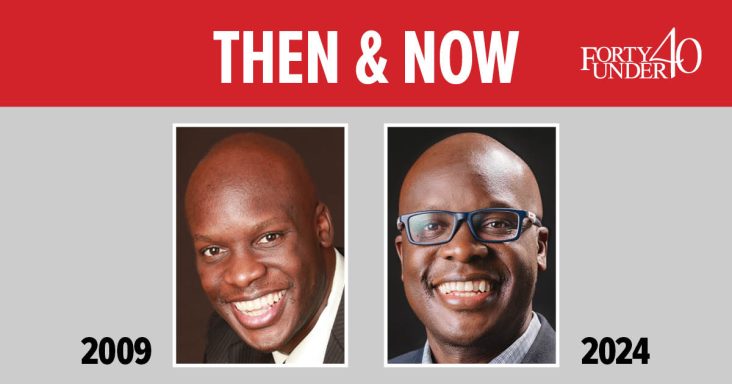Then & Now: Mwaba makes an impact by blending profit, purpose
by October 16, 2024 9:20 am 315 views

Jonathan Mwaba’s business philosophy focuses on the “triple bottom line,” which reflects a business that’s financially successful, benefits the community and improves the economic well-being of the people.
“I don’t just live it. I sow it,” he said.
Fifteen years ago, he sowed it through his work creating oceanic wind farms with African governments and the World Trade Center Association, which earned him a spot, at age 28, in the Northwest Arkansas Business Journal’s 2009 Forty Under 40 class.
Today, he sows it through his work as CEO of Rogers-based Global Agribusiness Ventures Inc. (GAV), which he co-founded in 2019. A “network of agribusiness and project management experts,” the company is dedicated to bringing agricultural solutions to communities in developing countries that need them most through public-private partnerships that promote national ownership and work to find solutions to poverty and hunger, according to its website.
Focused on “blending profit with purpose,” Mwaba, 43, works to promote sustainable development.
“It’s something that has continued to be a thread in my career. So, my passion for making a positive impact on people’s lives through business remains a driving force for me.”
Born in Zambia, Mwaba was educated in South Africa. The first African to graduate with a master’s degree from the Clinton School of Public Service in Little Rock, he also holds multiple graduate degrees from John Brown University, the University of Arkansas Sam M. Walton College of Business and was part of the Prince of Wales’s business and sustainability post-grad program at the University of Cambridge in the United Kingdom. He’s also worked with large companies, including Johnson & Johnson and Walmart.
“Having been born in Africa, everything I do is Africa-facing because it’s where I was born, and I want to make an impact just like my father, who I idolize. He was blind, and he was able to make a huge impact on this world,” Mwaba said.
Mwaba is now helping pioneer the first cashew processing facilities in the United States in an effort to streamline the cashew supply chain from 6,000 cashew outgrower farmer operations in Ghana and other west African countries to the U.S. The top importer of processed cashews, U.S. imports exceed 150,000 metric tons annually. The U.S. and Canada account for 90% of global cashew consumption. Demand is expected to grow 4.6% annually.
“The project will create jobs in the U.S. and make a generational economic impact in Africa,” Mwaba said. “Ten percent of the company is actually owned by these cashew outgrower farmers. We’re not just looking to extract. We’ve partnered with the 6,000 plus cashew outgrower farmers and said let’s change the model, let’s make a generational economic difference, so children being born today can have access to health care, clean drinking water and education that sets them up for the future. Not just education that’s just learning to read and write, but prepares them for a global workforce.”
Raw cashews are bought by brokers and shipped from west Africa to be processed in either India or Vietnam. Mwaba’s company plans to eliminate brokers and create processing facilities in the U.S. for the 2 million metric tons of unprocessed, in-shell cashews west Africa produces each year. The global export raw value of cashews in 2023 was $7.02 billion and is expected to reach $10.5 billion by 2031.
Shipping directly to the U.S. for processing means fresher cashews and lower costs for consumers. Mwaba expects to have 50% of the market share in five years, with cashews eventually being shipped from the U.S. to Europe, another large market.
The company recently received $26 million in government funding through a program aimed at boosting U.S. manufacturing and exports. The company will receive its first cashew shipment in about nine months.
Mwaba’s vision of “a legacy impact” means “being part of something bigger than yourself,” which translates to job creation in the U.S., and creating generational economic change in Africa.
“The biggest success, and silver lining, is to be able to bring all these stakeholders along and being able to see that journey come to fruition with all the different stakeholders at the table.”
